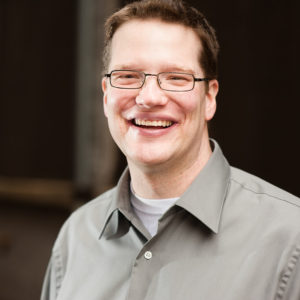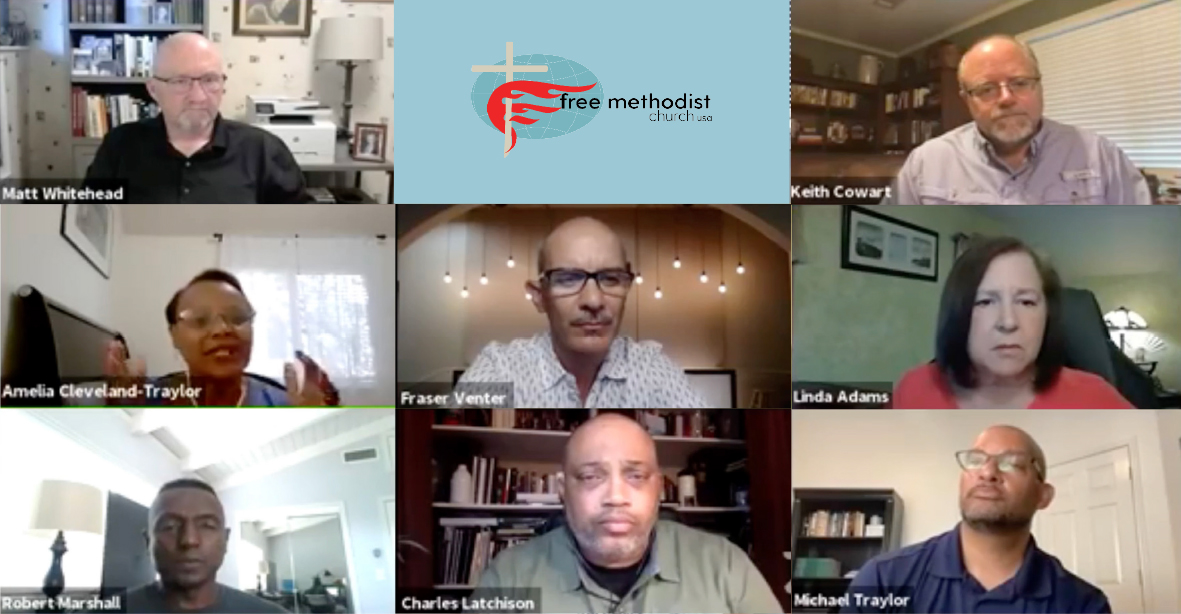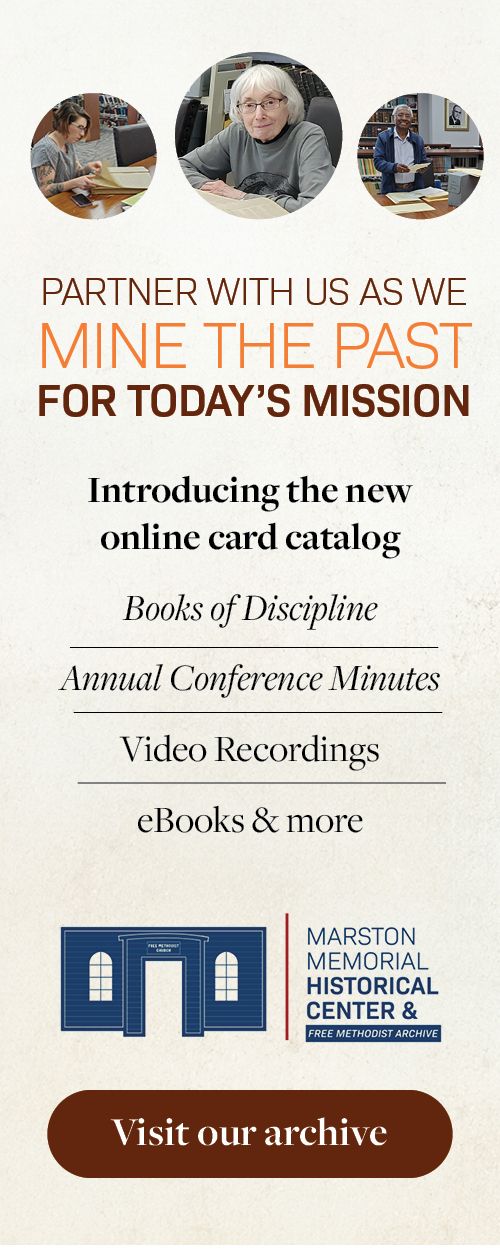
Jeff Finley
Light + Life Executive Editor
Jeff Finley is this magazine’s executive editor. He joined the Light+Life team in 2011 after a dozen years of reporting and editing for Sun-Times Media. He is a member of John Wesley Free Methodist Church where his wife, Jen, serves as the lead pastor.
by Jeff Finely
Three weeks after five African American leaders gathered with three bishops for a Facebook Live conversation titled “Talk, Listen & Learn Together,” the same group of eight met online again to continue the conversation about how to end racial division.
As “Continuing the Conversation” began, Bishop Keith Cowart emphasized the importance of endurance as the Free Methodist Church – USA addresses diversity in the church.
“We must have the will to endure beyond mere talk to real change, to action steps that will bring about real change,” said Cowart, who also noted that diversity isn’t limited to Black and White. “We are a multiethnic nation, and we are a multiethnic denomination, and so it’s not that we’re tone-deaf to the fact that it’s a broader issue.”
Cowart said other diversity issues are being considered, but the online conversation “was initially spurred by the recent events that very much are oriented in the Black-White issue. Secondly, there is something very distinct and unique about the White-Black relationship in America that requires a different kind of conversation.”
Robert Marshall, the director of the African Heritage Network and the lead pastor of Los Angeles Community Church, served as the emcee for the conversation and asked questions of the bishops and other panelists. Marshall noted that racism isn’t just an issue in the street, but it is a systemic problem that affects every American institution including the church.
In response to a question from Marshall asking if there are degrees of racism, Bishop Linda Adams said that one of the commitments that came out of the General Conference 2019 resolution on racism and “the worth and value of all persons” is “to recognize and learn that structures are a huge part of the issue, so we’ve been trying to educate ourselves.” Adams shared that she and the other bishops recently read an article in The Atlantic by John Rice, the founder and CEO of Management Leadership for Tomorrow, about “The Difference Between First-Degree Racism and Third-Degree Racism.” Adams explained that third-degree racism, such as redlining in real estate, includes “benefiting without even meaning to, without even knowing I harmed somebody, and yet the system has advantaged me.”
Bishop Matt Whitehead said that although discussing racism can be uncomfortable, “as believers in the Lord Jesus Christ, as Free Methodists, we are called to have this conversation, and as you’ve probably heard me say before, it’s not a conservative issue. It’s not a liberal issue. It’s a gospel issue. It’s a Jesus issue.”
Whitehead said that “one of the challenges, particularly for those of us in the White majority, is that we have thought only of first-degree racism. … I think we need to broaden our definition and understand, by God’s grace, that we have to see that this is a significant issue.”
Cowart said that to see beyond first-degree racism, people can be part of a diverse community with deep friendships that allow people to “speak deeply into each other’s lives.” He emphasized that the Spirit calls us to humility. “We really do have to come to the point where our greatest desire is to be open and softhearted before the Lord and before one another — to say our love for one another is greater than our pride, our ego, our lack of understanding.”
Charles Latchison, a superintendent of the Free Methodist Church in Southern California and the lead pastor of Light & Life West Church, said, “I really love and appreciate the whole matter of a deep call of the Spirit to humility. These are exceptional times, and there needs to be a surrender like we’ve never engaged before, and I think we could not be in a better season to be able to do that. … You cannot have enough quiet time during quarantine.”
Latchison said that when he began attending the African Heritage Network’s meetings, he heard pastors’ stories about conflict, misunderstanding and not being considered for positions in their conferences. “They would cry. It was the only place we could really be as expressive without any consequences for complaining and being angry.”
Michael Traylor, a River Conference superintendent, pointed to research by Michael O. Emerson and Christian Smith that found “not only were evangelical churches separated by race but that oftentimes White evangelical self-identified conservative Christians had a difficult time understanding the systemic or structural means of almost everything. … I also think that has pervaded our theological lens.”
Traylor said some pastors focus on simple theological statements in Scripture without looking at the cultural and structural issues that Jesus and the apostles were trying to address. “Part of the thing that we need to do is to work on equipping our pastors and our leaders with this — for lack of a better word — theological imagination that allows you to see Scripture in all of the different levels in which the Word shares.”
The leaders discussed that some Christians emphasize a skewed or incomplete version of history that leaves out the experiences of many people, and we may not realize that holiness should include changing our culture.
“The lens through which people of color see the history of the church and the history of the country is very, very different,” said Amelia Cleveland-Traylor, a River Conference superintendent and a member of the FMCUSA Board of Administration.
“The church has been called to change the nation,” said Fraser Venter, a superintendent of the Free Methodist Church in Southern California and the lead pastor of Cucamonga Christian Fellowship, who quoted Harriet Tubman’s statement that “I couldn’t justify being free while others were enslaved.” He added, “The church should be in a position — and with the anointing and authority — to step into the culture and say, ‘I can’t justify being free in Christ while others are being enslaved.’”
Marshall, the African Heritage Network director, also discussed U.S. history. He said political parties gather around division and fear, but God’s people are “called to be a city set on a hill, and a people who are salt, and if the salt loses its flavor, what good is it?”
The Image of God
Marshall said a misconception is that Christian theology originated with White people, but early church leaders Athanasius and Augustine hailed from Africa. “They contributed mightily to shape the theology that we have in every Christian seminary,” he said. “It’s really important to know that these people came from all over the world because the story of God is that He made us in His own image and in His own language.” He asked the panel, “Can you explain to our audience how important is the theological construct of the image and likeness of God?”
Venter said the correct kind of discipleship is vital because racism also “is discipled. Racism is actually the antithesis of the imago Dei; isn’t it? It is the counterfeit of what God has called us to be from the very beginning of creation.”
Cleveland-Traylor said that centuries of slavery and racism have drilled concepts into our minds that can’t instantly be turned off. “I really feel that those years of slavery where Black and Brown people were always less than, it didn’t matter when you changed their condition in society so that they were no longer slaves. They remained ‘less than’ in minds of everyone around.”
Michael Traylor said “we have to recognize that in issues of racism, there is always a theological underpinning” and to understand “the idea that we’re created in the image of God, and we honor God by honoring one another and seeing that dignity in one another.” He said the image of God is “a core principle in our creation narratives and in our salvation narratives even, but it’s fascinating to me that when you think about it … racism is really the distortion or the denial or the dehumanization of the image of God.”
Latchison said the tone for discipleship may be set by people who “have a mindset or a value set that there’s a certain kind of people who cannot be converted or that image cannot fully appear in a certain kind of people.” He said he’s asking himself and others, “What is this season challenging in you? Do I need to look at again what I understand about the image of God and the whole kingdom concept of that being restored in every person?”
Whitehead said that we sometimes project our stories and journeys onto others without listening to their experiences, but if we believe that humans are created in the image of God, “it means that we will listen to one another who have perspectives that are different than ours.”
Adams noted that Genesis 1:27 states that both “male and female” are created in God’s image, and she cited Free Methodist founder B.T. Roberts’ emphasis of “one-bloodism” based on Galatians 3:28. She said, “That is life together, corporate oneness that benefits from the variety that’s there of the different races and the genders.”
Cowart connected being made in God’s image to the theology of the Trinity. “If God is Father, Son, Holy Spirit, that means God’s nature is relational. It’s community,” he said. “If I’m made in the image of God, it means I am fundamentally made for community, for relationship, and what defines that relationship is love.”
Fear of Change
Marshall then asked how fear relates to racism.
Cowart said people “fear the unknown, which drives us to cling to that which is comfortable, to cling to that which is known, and that begins to contribute to the kinds of things that we see in systemic racism, and so I think we have to have a willingness to say, ‘I am going to intentionally step out of that comfort zone and choose to take a path that’s more unknown.’”
Whitehead said that as we discuss racism, some people confuse “the biblical call to pursue justice, to love righteousness, as being on the slippery slope towards theological liberalism, and nothing could be farther from the truth.”
Adams said that as a lifelong Free Methodist, she’s observed, “In terms of fear, we’re just afraid of change. We have a certain denominational culture that needs to change. For the voices who are helping us understand how it needs to change, I’m grateful, and I think it is a God moment, a kairos moment. There’s a change brewing.” Adams believes the change is from the Holy Spirit, and she drew upon 1 John 4:18 and 2 Timothy 1:7 as she reminded the church, “There is no fear in love. Perfect love drives out fear. God has not given us a spirit of fear, but of power and love, and of sound mind.”
Marshall asked the panelists what it means to the church that perfect love drives out fear.
Cleveland-Traylor said like Joseph’s brothers, some White Americans live in fear of retribution, but “the goal of most African Americans isn’t to actually harm White people. The goal of most African Americans is just to level the playing field, to be invited into the game, to be seen as valued, to be respected, to be treated right.”
Michael Traylor said, “This idea of always being feared just keeps us from being able to come together, even for common fellowship. … Intentionally loving others destroys and dismantles this fear.”
Latchison echoed his previous call to ask ourselves how the current time is challenging us. “Where is it requiring that we stretch? … If we’re seeking to keep a pure heart before the Lord, if we’re seeking to please Him, we have to be asking that question.”
Venter said Scripture references fear in contrast to faith, and we need to recognize “fear is one of the deep roots of the challenges we’re facing in so many ways, that it’s our opportunity to begin to think about what our response should be, and as a people of faith, our response should be in faith.”
Visit fmchr.ch/continuing to watch the video of the conversation and read more quotes from participants.+

Jeff Finley
Light + Life Executive Editor
Jeff Finley is this magazine’s executive editor. He joined the Light+Life team in 2011 after a dozen years of reporting and editing for Sun-Times Media. He is a member of John Wesley Free Methodist Church where his wife, Jen, serves as the lead pastor.









